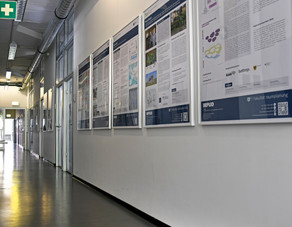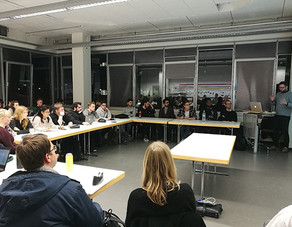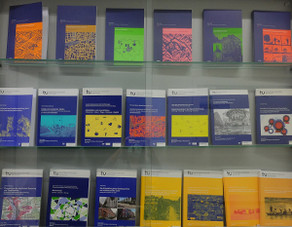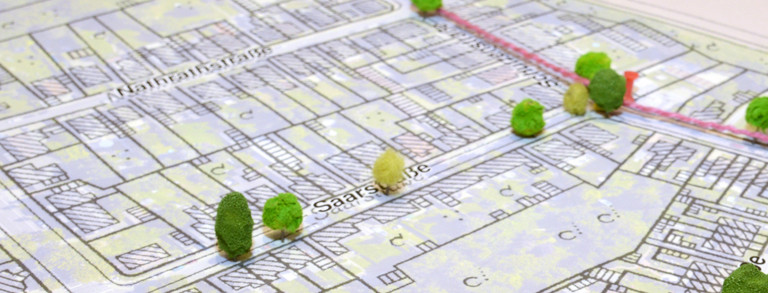Projects chronologically
- FloodJustice (2026 - 2028)
- SUR (2024 - 2025) - Strengthening Urban resilience in the Areas of Supply Infrastructure and Housing in Ukraine
- ALBATROSS (2024 - 2027) - Advancing knowledge for Long-term Benefits and Climate Adaptation through holistic Climate Services and Nature-based Solution
- Grün4Kritis (2024 - 2026)
- LAND4CLIMATE - Utilization of private land for mainstreaming nature-based solution in the systemic transformation towards a climate-resilient Europe (2023 - 2027)
- RENUWAS - Resilient management of conflicts of use in the water supply in Herten (2023 - 2026)
- Urban-Act - Integrated Urban Climate Action for Low-Carbon & Resilient Cities (2022 - 2026)
- ANFO - Strategy to Adapt to the Impact of Drought in Olfen (2020 - 2023)
- DAZWISCHEN - Future-Oriented Structural Change in The Rhenish Mining Area (2020 - 2023)
- Evolving Regions - Implementation of Regional Climate-Adaptation-Processes in NRW and the Netherlands in Form of Road-map Procedures and Regional Climate-Impact-Analyses (2019 - 2023)
- ICOLMA - Impact of COVID19 on livelihoods, mobility and accessibility of marginalised groups (2022-2025)
- IMPULS - Impulses for a sustainable, inter-municipally coordinated services of general interest in the Harz planning region (2021 - 2024)
- KAHR - Scientific monitoring of the reconstruction processes after the flood disaster in Rhineland-Palatinate and North Rhine-Westphalia: Impulses for Resilience and Climate Adaptation (2021 - 2024)
- LIRLAP - Linking Disaster Risk Governance and Land-Use Planning: The Case of Informal Settlements in Hazard Prone Areas in the Philippines (2019 - 2025)
- MiTra-WA - Migration and Translocality in West Africa: An Analysis of Migration, Urbanisation and Climate Change (2021 - 2024)
- RESI-extrem II - Application and stabilization of resilience strategies for cities in dealing with spatially ubiquitous extreme weather events (2021 - 2023)
- SysKa - Integration of systemic criticality into disaster management planning (2021 - 2022)
- TransMiT - Resource Optimisation of Mixed and Separating Drainage in Existing Urban Districts with Intensive Settlement Pressure (2019 - 2022)
- ZURES II - Application and continuation of future-oriented climate and vulnerability scenarios in selected instruments and planning processes (2020-2022)
- GOPLAREA - Governance and Planning of Resilient Cities in East Africa (2017 - 2021)
- LIPSINDAR - Linking Partners for Sustainable and Inclusive Dar es Salaam (2018 - 2021)
- KlimaWaGe - Elaboration of a Guideline for Commercial and Industrial Areas Adapted to Climate Change Using the Example of The City of Bottrop (2019 - 2021)
- ESPON TITAN - Territorial Impacts of Natural Disasters (2019 - 2021)
- AQUACLEW - Advancing Quality of Climate services for European Water (2017 - 2020)
- ZUKUR – Zukunft-Stadt-Region-Ruhr (2017 - 2020)
- RESI-extrem - Resilience Building after Extreme Events: Lessons Learned and New Strategies for Cities in Dealing with Ubiquitous Extreme Events (2017 - 2020)
- BaumAdapt - Optimisation of City Wide Ecosystem Services of Urban Tree Population in Accordance With the Resilience of Critical Infrastructure with A Focus on Summer Strong Wind Events and Climate Adaptation (2018 - 2020)
- InKlaH - Integrated adaptation concept for the city of Hagen (2015 - 2018)
- DFG-Projekt - Impact of Demographic Change on the Sensitivity of Cities with regard to Climate Change (2015 - 2018)
- SWICCA - Service for Water Indicators in Climate Change Adaptation (2015 - 2018)
- Perspektive Beruf - Implementation of a Cross-agency Transition System (2011 - 2013)
- C-LIEGE - Clean Last Mile Transport and Logistics Management for Smart and Efficient Local Governments in Europe (2011 - 2013)
- Das arbeitsteilige System deutscher Metropolregionen (2009 - 2012)
- ERA NET Crue IMRA - Integrative flood risk governance approach for improvement of risk awareness and increased public participation (2009 - 2011)
- MOVE - Methods for the Improvement of Vulnerability Assessment in Europe (2008 - 2011)
- ESPON Climate - Climate change and territorial effects on regions and local economies (2009 - 2011)
- Mountain Risks (2007 - 2010)
- Klimawandelgerechte Stadtentwicklung (2009 - 2010)
- ESPON EDORA - European Development Opportunities for Rural Areas (2008 - 2010)
- INCA - Linking civil protection and planning by agreement on objectives (2009 - 2010)
- Assessment of upstream flood risk in the Rhine Basin (2008 - 2009)
- Das montanindustrielle Erbe des Ruhrgebiets (2008 - 2009)
- REFINA - Integrierte Wohnstandortberatung als Beitrag zur Reduzierung der Flächeninanspruchnahme (2006 - 2009)
- Raumentwicklungsstrategien zum Klimawandel (2008 - 2009)
- PRESOM - Privatisierung und das Europäische Soziale Modell (2006 - 2009)
- LEAN2 - Kommunale Finanzen und nachhaltiges Flächenmanagement (2006 - 2009)
- INTERREG III B-Begleitforschung - Vorbereitung strategischer Projekte der transnationalen Zusammenarbeit (2006 - 2008)
- Midir - Multidimensional Integrated Risk Governance (2006 - 2008)
- Megacities - Dar es Salaam (2005 - 2008)
- ARMONIA - Applied Multi Risk Mapping of Natural Hazards for Impact Assessment (2004 - 2007)
- Berufsfeld Raumplanung: AbsolventInnenbefragungen 2005 und 2007 (2005 - 2007)
- The Influence of Central Grants on District Development in Ghana (1995 - 2007)
- Akteure, Beweggründe, Triebkräfte der Suburbanisierung (2005 - 2006)
- ESPON 2.3.1: Anwendung und Auswirkungen des EUREK in Mitgliedsstaaten (2004 - 2006)
- ESPON 2.3.2: Governance in Stadt- und Regionalplanung von der EU bis zur lokalen Ebene (2004 - 2006)
- Flusslandschaften (2004 - 2006)
- Einführung eines Lern-Management-Systems in das Projektstudium der Raumplanung (2005 - 2006)
- ESPON 1.3.1: Räumliche Auswirkungen von Katastrophen (2002 - 2005)
- SERA: Studie zur Beschäftigungssituation in ländlichen Gebieten (2005)
- Wohnungsmarktbeobachtung (1993 - 2005)
- AsPIRE: Aspatial Peripherality (2001 - 2004)
- Biotope Management in Korea (2003 - 2004)
- ESPON 2.1.3: Räumliche Auswirkungen der EU-Agrarpolitik (2002 - 2004)
- ILUMASS: Flächennutzung und Verkehr (2001 - 2004)
- Integration von Umwelt-Teilmodellen in das IRPUD-Modell (1998 - 2004)
- Bergstudie: Analyse von Berggebieten (2002 - 2003)
- Europäische Verkehrsnetze (1991 - 2003)
- FRAME: Freizeitmobilität älterer Menschen (2000 - 2003)
- Städteregion Ruhr 2030 (2001 - 2003)
- IASON: Räumliche Wirkungen europäischer Verkehrsmaßnahmen (2001 - 2003)
- Berufsfeld Raumplanung (2001 - 2002)
- PROPOLIS: Nachhaltige Stadtentwicklung in europäischen Stadtregionen (2000 - 2002)
- Soziale Stadt (2000 - 2002)
- Via Egnatia: Fallstudie zum Autobahnbau (2002)
- VUGIS: Verkehrsplanung und GIS (2000 - 2002)
- EMNIGES: Globalzuschuss und EU-Strukturfonds (2000 - 2001)
- Grenzland oder Schmelztiegel? (2000 - 2001)
- Nahverkehrspläne im Vergleich (2000 - 2001)
- PRIDE: Partnerships for Integrated Rural Development (1999 - 2001)
- VETHSI: Virtual European Textile Heritage Sites' Itineraries (2000 - 2001)
- GEMACA II: Europäische Metropolregionen (2000 - 2001)
- Ex-Ante-Evaluierung von EU-Regionalprogrammen in Bayern (1999 - 2000)
- IBA und Frauen (2000)
- Nationalatlas Bundesrepublik Deutschland (2000)
- Peripheralität: Bestimmung des Europäischen Peripheralitätsindex E.P.I. (2000)
- Rad Radius Reisezeit (2000)
- SASI: Räumliche Auswirkungen der transeuropäischen Netze (1996 - 2000)
- SPESP: Studienprogramm zur europäischen Raumplanung (1999 - 2000)
- Sustainable Mobility in Cities (1997 - 2000)
- TRANSLAND: Integration von Verkehrs- und Flächennutzungsplanung (1999 - 2000)
- TRILAT: Nachhaltige Verkehrsplanung in Israel und Palästina (1997 - 2000)
- Wohnungssituation in Palästina (2000)
- VASAB 2010 plus (2000)
- Einfach und selber bauen (1998 - 1999)
- Eisenbahn- und Straßenisochronen von Berlin (1999)
- Globalisierung und Modewirtschaft (1997 - 1999)
- INTERNAT: Strategische Umweltbewertung (1999)
- Migration ohne Ortswechsel? (1998 - 1999)
- Produkte aus der Region für die Region (1999)
- Visualisierung der Beschleunigung (1996 - 1999)
- Bewohnergetragene Projekte zur integrierten Entwicklung von Großsiedlungen (1995 - 1998)
- EUROSIL: European Strategic Intermodal Links (1997 - 1998)
- Frauenwohnprojekte (1997 - 1998)
- Geoinformationssysteme in der kommunalen Planung (1993 - 1998)
- Gesellschaftliche Desintegration und ethnisch-kulturelle Konflikte (1996 - 1998)
- Gestaltung naturnaher Bereiche im Lausitzer Braunkohlerevier (1995 - 1998)
- Informationssystem für die Modewirtschaft (1996 - 1998)
- Kompensationsmanagement (1998)
- Mehr Bauland +5 (1998)
- Nachhaltige räumliche Stadtentwicklung in Kwangju in Südkorea (1995 - 1998)
- Nachhaltigkeitsindikatoren (1998)
- Naturnahe Regenwasserbewirtschaftung (1994 - 1998)
- Netzwerke im Ruhrgebiet (1997 - 1998)
- Neue Armut in der Stadt (1996 - 1998)
- Prognose der regionalen Beschäftigungsentwicklung 2004 (1997 - 1998)
- Projektion der regionalen Arbeitsmarktentwicklung 2004 (1997 - 1998)
- Räumliche Datenbasis für die satellitengestützte Lokalisierung von Eisenbahngüterwaggons (1995 - 1998)
- Räumliche Integration von AusländerInnen und AussiedlerInnen (1995 - 1998)
- Regionale Qualität der Arbeitsplätze (1995 - 1998)
- SPARTACUS: System for Planning Urban Sustainability (1996 - 1998)
- Städte der Zukunft (1997 - 1998)
- STREAMS: Strategic Transport Research (1996 - 1998)
- Verkehrslärmprognose für Lünen (1998)
- Nachhaltige räumliche Stadtstrukturen (1993 - 1998)
- Berufspendler - Trennung von Wohnort und Arbeitsort (1997)
- Dortmund und die Eisenbahn (1997)
- Aktualisierung der Beschäftigungsprognose 2000 (1995 - 1996)
- Benachteiligte Stadtquartiere (1994 - 1996)
- Bodenrechtliche Probleme bei der Revitalisierung ostdeutscher Innenstädte (1995 - 1996)
- Decentralized Rural Regional Development Planning in Thailand (1995 - 1996)
- Decentralizing Small-Scale Industry Promotion in Ghana (1995 - 1996)
- Lkw-Gewichtsbegrenzung (1995 - 1996)
- Modewirtschaft in NRW (1993 - 1996)
- Neue Kooperationsformen in der Stadterneuerung (1994 - 1996)
- Small-Scale Industries in Thailand (1995 - 1996)
- Stadtentwicklung Dar es Salaam (1996)
- Südeuropäische Metropolen (1994 - 1996)
- Ex-post Evaluierung von Ziel-2-Regionalprogrammen (1996)
- Regionale Selbstorganisation (1993 - 1995)
- Transeuropäische Netze und Erreichbarkeit in Europa (1995)
- Berufsfeld Raumplanung (1993 - 1994)
- Bündelungspotential von Pendlerfahrten (1991 - 1994)
- Büroflächenprognose Essen 2000 (1994)
- Dortmund 1918-1946 (1993 - 1994)
- Regionale Beschäftigungsprognose 2000 (1993 - 1994)
- Zeitkarten (1992 - 1994)
- Ex-ante Evaluierung von Ziel-2-Regionalprogrammen (1994)






